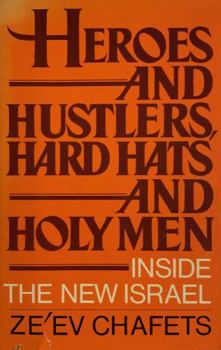Heroes and Hustlers, Hard Hats and Holy Men: Inside the New Israel
Select Format
Select Condition 
Book Overview
No Synopsis Available.
Format:Hardcover
Language:English
ISBN:0688043372
ISBN13:9780688043377
Release Date:January 1986
Publisher:William Morrow & Company
Length:249 Pages
Weight:1.18 lbs.
Related Subjects
History Israel Middle East Politics & Social Sciences Social Science Social SciencesCustomer Reviews
2 ratings
An interesting view of Israel
Published by Thriftbooks.com User , 19 years ago
This book was written in 1986 and the author does a good job in describing Israel at that time. One interesting question Chafets raises is this: given that anti-Semitism is irrational, ought Israelis view the Arab war against them as basically irrational or as basically a rational dispute over territory (or maybe a dispute between two competing nationalisms). Chafets calls the first approach "emotionalist" and the second "rationalist." I think that's kind of funny. Even Chafets admits that the latter group tends to view Israel as largely to blame for Arab aggression. Is that really rational? In my opinion, the German takeover of Czechoslovakia in the 1930s was not a battle of competing nationalisms. The Czechs had no designs on Germany. Similarly, the Israelis have no designs on Saudi Arabia, or any other Arab lands. Their crime is to want to keep their own land, and their reason is because they can't defend their rights without it. The Arab war on Israel does not make sense as a dispute over territory either. The Arabs are land-rich! They could have had every inch of Israel, with Jewish approval, had they been willing to abide Jewish rights there. But they weren't willing to do that. Now, they want to find a way to destroy Jewish rights, and that means finding an excuse, any excuse to destroy Israel. Does that make me an "emotionalist?" Well, no. I'm just being rational. Since I'm not an Arab or Israeli, that ought to be the end of it. But I'm writing about this because I support truth and scholarship. And in this war, I've seen the opponents of Israel behave in a nearly uniform anti-scholarly and dishonest manner. In short, the "emotionalists" are right. Those who wanted to deprive Jews of human rights did not have enough fun in the last ten or fifteen centuries. Not even World War Two was good enough to satisfy them. Now they want more, and they are happy to sacrifice academic standards, justice, and anything else that gets in their way. Chafets does not come to this conclusion at all. Instead, he merely points out that Israeli attitudes are ambivalent. But there are a couple of places where I think what Chafets says, in all sincerity, ought to be reflected upon. For example, he says that when terrorists murdered hostages at Maalot, "the chances of Israel negotiating with Yasir Arafat ended for good." Obviously, Israel got pressured into negotiating with Arafat anyway. And upon reflection, most of us can see that this was an error. Maybe upon further reflection, most of us can see that in the future, terrorized nations may be far less likely to negotiate with thugs such as Arafat. I think Chafets is good at describing Israel, and he seems to give us a reasonable picture of the place. I recommend this book.
An essentially accurate and sympathetic book
Published by Thriftbooks.com User , 19 years ago
This is an essentially accurate and sympathetic book. Chafets for many years was a journalist at the 'Jerusalem Report' and followed what was happening in Israel very closely. He before that served as an Advisor to Prime Minister Begin. He is a writer who makes an effort to meet with people from all walks of life, escape the common cliches of the media, and provide his own special perspective. He provides an interesting look at Israeli society as it appeared nearly two decades ago.





